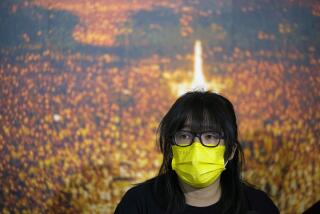Letter Calling for ‘Reassessment’ of Tiananmen Shakes Party Meeting
- Share via
BEIJING — The political ghost who surfaced to haunt the key national Communist Party congress here Monday reminded everyone that the memory of the army’s brutal crackdown at Tiananmen Square eight years ago has not been erased.
At the center of the controversy--just as he was in 1989--is former Communist Party Secretary-General Zhao Ziyang. A letter purportedly written by Zhao, an avid reformer who was removed from the party’s top position after he opposed using the army to crush demonstrations in and around Tiananmen, appeared in Hong Kong newspapers Monday and quickly made the rounds of the capital, stirring up the tightly controlled 15th party congress.
The typed three-page letter called for a public “reassessment” of the June 4, 1989, incident in which army tanks and soldiers killed hundreds, perhaps thousands, of civilians. “While the military suppression calmed the situation down,” the letter stated, “we cannot but say that the people, the army, the party and government and our country all paid a great price.”
Among Chinese political reformers, including some members of the party and senior army officers, such a review is considered an essential step toward healing a national wound and restoring international respect.
“Even if these issues cannot be resolved immediately, it may do some good to just talk about them,” said Xu Jiatun, a longtime Zhao ally and one of the most senior officials to quit over the Tiananmen incident, in a telephone interview. “Doing so would cause the current regime to contemplate the issues. It would put some pressure on them.”
Xu would not comment on the contents of the letter--which bore Zhao’s name but not his signature--until its authorship could be confirmed. But Xu, who left China after the 1989 episode and now lives in Southern California, said there is a “good possibility” that the letter is genuine.
“If he really wrote it, that’s quite a big move on his part,” added Xu, who under Zhao was China’s top representative in Hong Kong. He has since written articles in support of loosening restrictions on Zhao’s travel and speech.
Without word from Zhao himself, it is impossible to confirm that the 78-year-old former leader wrote the letter; nor could it be determined whether it was received for consideration by the presidium of the party congress that opened here Friday.
Since 1989, Zhao has been under virtual house arrest at a large courtyard home near the center of Beijing. Reporters who attempted to talk with Zhao at his home Monday were told by guards at the gate that he no longer lived there. Neighbors, however, confirmed that the former political chief is still a resident and has been seen leaving the compound under escort for occasional games of golf at a suburban country club.
A spokesman for the party congress, Xu Guangchun, flatly denied reports that such a letter had reached the senior party leadership. “We have not received such a letter,” Xu said Monday at a news conference. “With regard to the question of June 4 [1989], our party and the government have already made the right decision.”
Wu Guoguang, a former People’s Daily journalist and close ally of Zhao, said Monday that he believed the letter is genuine. “From what I understand, from my channels, I believe the letter is real,” Wu, now a professor of government at Chinese University in Hong Kong, said in a telephone interview.
*
A rethinking of Tiananmen could have heavy domestic political consequences, just as the reassessment and condemnation of the excesses of the 1966-76 Cultural Revolution led to political purges and rehabilitations in the late 1970s. In this case, a public review could prove particularly difficult for Chinese Premier Li Peng, who declared martial law in 1989 and is a staunch defender of the army crackdown.
Only last week, former Beijing party secretary and Politburo member Chen Xitong, a prominent figure in the Tiananmen incident, was expelled from the party for corruption and faces criminal prosecution.
Most political analysts feel that Jiang Zemin, the Chinese president who is also party leader, would probably not be touched by a reassessment, since he was party chief in Shanghai at the time of the military action and was not involved in the decision to bring in the troops.
Likewise, National People’s Congress Chairman Qiao Shi, No. 3 in the party hierarchy, could also escape unscathed, since he reportedly opposed use of the army to quell the demonstrations and abstained in the critical vote to bring in the troops.
The weeklong party conference has been held mostly in secret, except for the opening day. And with few exceptions, most of the 2,048 delegates to the congress, held once every five years, have been isolated from reporters.
However, Xu Guangchun was confronted with questions about the Zhao letter Monday afternoon at a news conference called to introduce foreign and domestic reporters to five “model workers” chosen as delegates to the congress.
Reporters were allowed to ask the workers, including a plumber from Shanghai and a bus conductor from Beijing, if they had seen or heard about the Zhao letter. But before they could answer, their responses were cut off by the party spokesman who issued a flat denial.
*
Researcher Anthony Kuhn of The Times’ Beijing Bureau contributed to this report.
More to Read
Sign up for Essential California
The most important California stories and recommendations in your inbox every morning.
You may occasionally receive promotional content from the Los Angeles Times.













